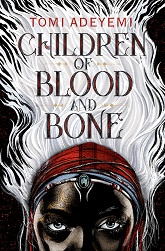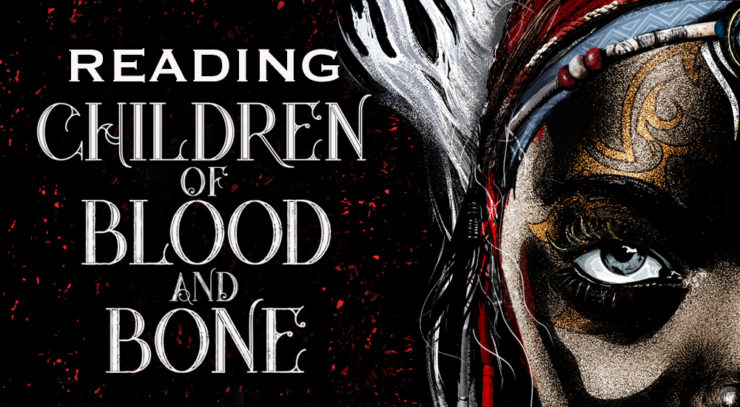Our reread of Children of Blood and Bone by Tomi Adeyemi continues with chapters 61-73 in which SO MUCH BAD STUFF HAPPENS. In thirteen action-packed chapters we get murder, torture, betrayal, schemes, and, uh, sex. What can I say? It’s a chaotic time for our stars.
Recap
On the hills above the camp, Zu tries to negotiate peace, but King Saran’s soldiers unleash hell. The quartet are separated as divîners scatter and fight back. Riding Nailah, Tzain and Amari make a grab for Zèlie but lose her to the guards. Amari, brilliant leader-in-training that she is, strategizes that Saran’s guards will be holding Zèlie at a nearby fortress and plots her rescue.
Bound by majacite cuffs, Zèlie is trapped in a cell. Just as she thinks things can’t get any worse, in walks Inan: He’s now one of her captors. Inan’s lost his fortitude but in return has gained his father’s… well, “support” is probably too strong of a word, but close enough. Saran tortures Zèlie after Inan is tossed out of the cell. Meanwhile, Amari and Tzain head into Gombe to see one of his Orïshan Games buddies about breaking his sister out of prison. Amari also makes a realization—that she should be the ruler of Orïsha, not her brother.
Later, Saran opens up to his son about how his first family died at the hands of maji. Inan sneaks back into Zèlie’s cell to rescue her, but his grand escape plan is foiled by an explosion caused by Amari and Tzain’s new sunstone-enhanced maji crew. Once again, Inan’s will utterly crumbles in the face of magic. He sees the assault on the fortress as a “slaughter, not a fight,” and willfully disregards the reason the maji are attacking in the first place. He turns Zèlie over to Tzain and Amari, but stays behind with his father.
The aftereffects of the majacite and torture have left Zèlie magic-less, but she doesn’t yet hate her prince. As she sleeps, she visits Inan in his dreamscape and they finally hook up. The next morning, the group head toward the seaside city of Jimeta to secure a boat to take them to the island. Their mysterious contact there is none other than Roën, the foreigner from the guerrilla camp. Their journey is stalled by Saran’s fleet heading to the island, but Roën’s crew capture a warship and trade up, using the ship as a disguise to beat Saran to the punch.
Commentary
So much for Inan’s dream to reunite Orïsha’s maji and kosidán. It’s clear now that whatever his plans were, they were about as substantial as a sheet of paper. Zèlie’s dangling from chains after watching as her friends were brutally slaughtered by soldiers and Inan has the nerve to “both sides” the assault. Yes, Kwame did burn a bunch of guards to death, but it was in defense of the camp and only after the soldiers led an unprovoked attack on a bunch of mostly unarmed teenagers.
Buy the Book


Children of Blood and Bone
Inan is an ally in name only, someone who says they support the resistance short of actually doing anything. He’s an ally until his own privilege is impacted. He claims he wants unification, but what he really wants is capitulation. He wants the divîners to wait, to go slow, to work at the speed of the kosidán. But it’s not freedom he sees as the destination now—the end of slavery perhaps, and less violence, but freedom means magic and magic means a power shift and that’s not something he’s willing to give up anymore. To make a real world comparison, Inan’s basically arguing that Jim Crow is better than slavery, which, yeah, okay, fine. But it’s not rainbows and unicorns either. Oppression is oppression is oppression.
“We can’t give people that kind of power,” he says immediately after saying “I thought things could be different. I wanted them to be different.” Both states cannot exist simultaneously. The latter negates the former. To him, giving divîners power—even if it’s equal power as citizens—means the kosidán must give up power. That’s not what Zèlie originally wanted, but with Inan’s betrayal it’s the result that she’s going to fight for now. Inan would argue he’s trying to save Zèlie’s life, but to what end? To deliver her back to slavery? To force upon her the guilt of trading her life for thousands of divîners? To make her bear the responsibility for sentencing another generation to slavery and abuse?
As a historical side note, Inan’s suggestion that “If we can improve their situation, we’ll quell the possibility of rebellions altogether” reminds me in a way of drapetomania. Back in 1851, Samuel Cartwright, a doctor working in Louisana and Mississippi, came up with the diagnosis as a way to explain why enslaved Africans ran away. Supposedly, drapetomania was caused by the poor management of the enslaved; proper treatment would “cure” the disease. In his own words:
… if his master or overseer be kind and gracious in his hearing towards him, without condescension, and at the same time ministers to his physical wants, and protects him from abuses, the negro is spell-bound, and cannot run away… If any one or more of them, at any time, are inclined to raise their heads to a level with their master or overseer, humanity and their own good requires that they should be punished until they fall into that submissive state which was intended for them to occupy. They have only to be kept in that state, and treated like children to prevent and cure them from running away.
Finally, before I wrap this reread up, we need to talk about that sex scene. After everything Zèlie has endured and after the decisions made by Inan, Tomi Adeyemi still insists on keeping their romance hot and heavy. I’m not sure what the point of that scene was, other than to extend a romance that by all accounts should be dead and buried. At first I thought maybe it was some confused reaction due to Zèlie’s PTSD, but no, they both still love each other deeply. I don’t get it and I’m not sure I care for the larger implications surrounding it. Does Zèlie no longer hold Inan responsible for his role in her torture? Does she not care that he was willing to save her life by sacrificing everyone else’s? What could possibly keep her interested in a man who tried to convince her to crush the very rebellion she risked her life for? I just… I dunno. It’s not working for me.
Terminology
- Tóju: a gathering place for divîners. Based on tọjú, the Yorùbá word for “to take care of.”
Placenames
- Kaduna: an island in the Lokoja Sea. Inspired by Kaduna, a trade and transportation hub and the capital city of Kaduna State in north-central Nigeria.
- Lokoja: a sea. Inspired by Lokoja, a trade hub on the bank of the Niger River in south-central Nigeria.
The end is nigh, as next week brings the final installment of our reread. We’ll be covering chapters 74-85, and the final confrontation.
Alex Brown is a high school librarian by day, local historian by night, author and writer by passion, and an ace/aro Black woman all the time. Keep up with her on Twitter and Insta, or follow along with her reading adventures on her blog.










